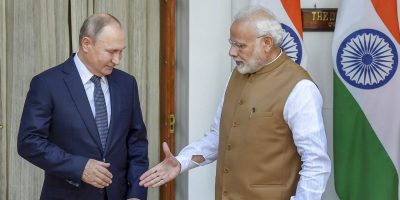Western Lambasting of India’s Russia-Ukraine Policy Reignites Discussions of Neo-colonialism

All Global Research articles can be read in 51 languages by activating the “Translate Website” drop down menu on the top banner of our home page (Desktop version).
To receive Global Research’s Daily Newsletter (selected articles), click here.
Visit and follow us on Instagram at @globalresearch_crg and Twitter at @crglobalization. Feel free to repost and share widely Global Research articles.
***
Earlier this month on pro-government IndiaTV, celebrity astrologer Acharya Indu Prakash presented an hour-long Ukraine special in which he predicted good fortune was 99% in favor of Putin. He said that Russia’s military operation in Ukraine “was the last resort for Mr. Putin, he was left with no options. Even now, attempts are being made to create this narrative that Putin is engaging in a bad war.”
Such an outlook would shock most Western audiences as this rhetoric is seldom heard. However, such an outlook is mostly shared across the political spectrum in India, as highlighted by an article published in The Washington Post on March 29, titled: “In India, a U.S. partner, Modi’s base is inundated with anti-U.S. commentary on Ukraine.” The opening sentence of the article wrote:
“Turn on a television in India this past month, and the arguments espoused by some of the country’s most popular media personalities follow a pattern: The United States provoked Russia into attacking Ukraine. The Americans were possibly developing biological weapons in Ukraine. Joe Biden, the US president who fumbled the American withdrawal from Afghanistan, has no business criticizing India over the war he sparked in Ukraine.”
Due to this position, New Delhi has been continuously lambasted by Western officials, media and academics for protecting the interests of the country and its citizens.
Among some of the many examples, White House press secretary Jen Psaki said for India to: “Think about where you want to stand when the history books are written in this moment in time, and support for the Russian leadership is support for an invasion that obviously is having a devastating impact”; Award-winning and renowned conservative American host of the Trish Regan Show tweeted: “If INDIA buys Russian crude oil, INDIA should expect to be sanctioned by the United States. And, believe me, that won’t work out so well for India’s economy. Right now: you’re with US or you’re against us. Simple”; and, The Telegraph newspaper complained that “India is the only Quad member not to have condemned the invasion.”
India, despite traditionally being a non-aligned country, joined the QUAD formation with the US, Japan and Australia to oppose China at sea in the so-called Indo-Pacific region. New Delhi believes that such a formation will be beneficial in its confrontation with China over its support for Pakistan and control of Aksai Chin, which New Delhi says is occupied by the East Asian country.
A Pew Research poll in 2017 found 49% of Indians viewed the US favorably while 47% viewed Russia favourably. A 2020 Pew Research poll found that 49% of Indians saw Russia positively, a significantly higher amount when compared to a quarter of Japanese and Australians and 19% of Americans who viewed the country favorably. Some domestic polls have shown that most Indians approve of their government abstaining from criticizing Russia, just as India did for the seventh time at the United Nations on March 25.
None-the-less, India’s cooperation with the US through the QUAD formation and its increasing confrontation with China appears to have created misunderstandings in Western capitals about New Delhi’s independent foreign policy. With the advent of the Special Military Operation in Ukraine, India maintained a balance by refusing to condemn and sanction Russia, something that has created great irritation in the West, thus demonstrating that they do not care for India’s interests but only in India serving their interests.
With Russia locked out of using Dollars and the SWIFT system, discussions of India-Russia trade in local currencies accelerated so much that purchases for agriculture, pharmaceuticals and energy without dollars will seemingly become a reality. The Reserve Bank of India reportedly met with officials from Russian banks VTB, Sberbank and Gazprombank so that a rupee-ruble trade mechanism could be established.
M. K. Bhadrakumar, an Indian columnist and former diplomat, highlighted that 60-70% of weaponry for India’s armed forces is of Russian origin, and that New Delhi’s capitulation to Western demands will “render a crippling blow to India’s defence preparedness.”
“By the colour of our skin, our religion, our culture, our geography, our political economy, we will never be accepted by the West as ‘one of us’. Do not be mesmerised by promises of equal partnerships […] Fundamentally, what the Western powers are planning is a form of neo-colonialism borne out of the desperate need to arrest the decline of their economies through a massive transfer of wealth from the rest of the world inhabited by 88% of mankind — Asia,” he added.
As Western condemnation against India intensifies, discussions of neo-colonialism is re-entering Indian discourse. Because India suffered from centuries of colonial rule, which saw an astronomical $45 trillion plundered by the British alone between 1765 to 1938 (almost 9 times the current combined GDP of Britain and India), the country never wants to be colonized again, including in the form of 21st century neo-colonialism.
Although the US has found India as an ally to oppose China, pushing the South Asian country to abandon all its interests and carefully crafted foreign policy to serve exclusively the interests of the West, whilst lambasting India for not adopting Western positions in issues that New Delhi has no business being involved in, will only strengthen the discourse of Western attempts of neo-colonialism against India.
*
Note to readers: Please click the share buttons above or below. Follow us on Instagram, @globalresearch_crg and Twitter at @crglobalization. Feel free to repost and share widely Global Research articles.
Paul Antonopoulos is an independent geopolitical analyst.
Featured image is from thewire.in

